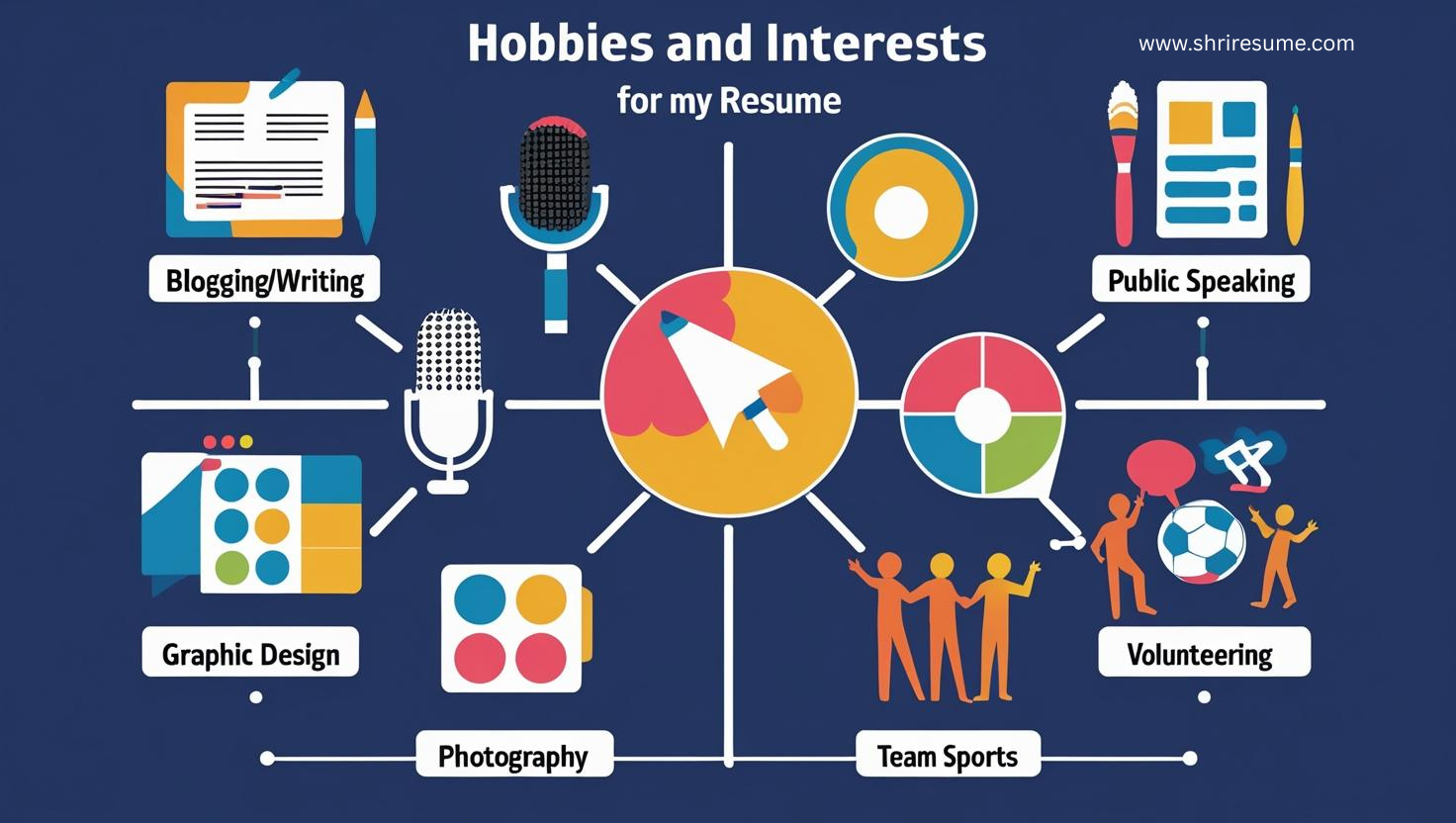List of Hobbies and Interests for Your Resume

Adding hobbies and interests to your resume can turn a good application into a great one. Many people overlook this section, unsure of its value. Yet, it’s an opportunity to stand out and show employers you’re not just about work.
This article promises practical tips on selecting the right hobbies and interests that align with your career goals.
With years of experience in recruitment and career consulting, I’ve seen firsthand how a well-crafted “Hobbies and Interests” section can offer applicants a competitive edge. It’s more than listing leisure activities; it’s about strategically showcasing facets of your personality and skills that job descriptions don’t always cover.
Ready to give your resume an upgrade?
Key Takeaways
- Adding hobbies and interests to your resume can make you stand out. They show you’re not just about work, but also have a well-rounded personality.
- Include hobbies that showcase skills like teamwork, leadership, creativity, and cultural awareness. This helps employers see your soft skills.
- Be honest and specific when listing hobbies and interests. Tailor them to align with the job you’re applying for and the company culture.
- Hobbies such as community involvement, creative pursuits, continuing education, professional development, and exploring cultures add depth to your profile.
- Use job - related keywords in this section of your resume. This makes it more relevant and appealing to potential employers.
Why Include Hobbies and Interests on Your Resume
Showcase a multidimensional person by [including hobbies and interests on your resume]. It offers cultural insight and adds depth to limited experience.

Showcase a multidimensional person
Your hobbies and interests on a resume tell a story about who you are beyond your work life.
Including hobbies and interests on your CV supports the presentation of yourself as more than just a professional. It displays your personal dimensions, showing that you have passions and engage in activities outside of work.
This can make you stand out to employers by highlighting unique skills or traits not evident from job experience alone.
Having diverse interests can hint at your ability to balance multiple aspects of life, suggesting strong time management skills. They reveal aspects like creativity, leadership, teamwork, and other soft skills important for any role.
Sharing personal hobbies makes you memorable and relatable, which can be especially advantageous during interviews.
Offer cultural insight
Including hobbies and interests on your resume can offer cultural insight into who you are as a person. It shows your engagement with diverse activities, such as exploring different cuisines or learning a new language, which showcases an open-mindedness and curiosity about the world around you.
This can demonstrate to potential employers that you bring a broader perspective to the table, making you an asset in today’s globalized work environment.
When listing hobbies and interests on your resume, consider including activities that reflect an appreciation for various cultures or traditions. For example, participation in cultural festivals or volunteer work with international communities can highlight your respect for diversity and inclusion within both personal and professional contexts.
Add depth to limited experience
To add depth to limited experience, showcasing hobbies and interests on your resume can provide insight into your personality and character. Including non-work related activities demonstrates your passion, commitment, and the ability to balance different aspects of life, offering potential employers a more holistic view of who you are beyond just your work history.
This can help compensate for any lack of professional experience and make you a more well-rounded candidate for the job. So by including relevant hobbies and interests that align with the company’s values or the job requirements, you can leverage this section to enhance your overall appeal as a prospective employee.
Including personal interests on your resume brings out qualities like dedication, leadership skills, creativity amongst others. These qualities would be beneficial in contributing positively towards any organization regardless of one’s professional experience levels.
How Hobbies and Interests Differ
Hobbies and interests add depth to your resume and [showcase a multidimensional person]. They also offer cultural insight, providing a unique perspective to potential employers.
Benefits of having hobbies and interests
Including hobbies and interests on your resume can showcase a multifaceted individual, offering cultural insight to potential employers. It adds depth to limited work experience, presenting a more well-rounded candidate.
Additionally, it provides an opportunity for the hiring manager to connect with you on a personal level, creating a memorable impression that goes beyond just professional qualifications.
These aspects contribute significantly towards making your resume stand out in a competitive job market .
Moreover, sharing hobbies and interests can indicate soft skills like teamwork or leadership acquired through community involvement or creative pursuits. Employers often seek candidates who are culturally aware and possess diverse interests; this makes including these activities crucial for highlighting your interpersonal skills and adaptability within different environments.
Examples of hobbies and interests for a resume
Including hobbies and interests on your resume can provide insight into your personality and add depth to your professional profile. Here are examples of hobbies and interests that could enhance your resume:
- Community Involvement:
Volunteering at local shelters or non- profit organizations.
Organizing charity events or participating in community clean- up projects.
Creative Pursuits:
Painting, drawing, or other visual arts.
Writing, blogging, or poetry.
Continuing Education:
Language learning or taking online courses related to your field.
Attending workshops or seminars to enhance skills relevant to your career.
Professional Development:
Participating in industry- related associations or clubs.
Mentoring or coaching others in your area of expertise.
Cultural Awareness:
Traveling and experiencing different cultures firsthand.
Learning about diverse cuisines or traditional dance forms.
By including these hobbies and interests on your resume, you can showcase a well-rounded persona beyond just professional achievements.
What Types of Hobbies to Include
Include hobbies related to community involvement, creative pursuits, continuing education, professional development, and cultural awareness. Tailor these activities towards showcasing a well-rounded individual.
Community involvement
Engaging in community involvement shows your commitment beyond work. Consider activities such as volunteering, organizing local events, or participating in neighborhood clean-ups. Showcasing your active participation can highlight your teamwork and leadership skills while demonstrating a well-rounded personality to potential employers.
Emphasize any roles that required organization, communication, or problem-solving to strengthen the impact of your community involvement on your resume.
Don’t forget to integrate relevant keywords from the KEYWORDS section throughout the content!
Creative pursuits
Engaging in creative pursuits, such as painting, writing, or photography, can demonstrate your artistic abilities and innovative thinking on a resume. These hobbies showcase your ability to think outside the box and bring a unique perspective to problem-solving tasks in the workplace.
Moreover, they indicate a passion for self-expression and attention to detail that can be valuable in various professional roles. Integrating creativity into your list of interests presents you as a well-rounded individual with an imaginative approach to both work and life.
Diving into creative hobbies like sculpting or graphic design not only reveals your artistic flair but also showcases your adaptability and willingness to learn new skills. Such pursuits portray you as someone who is proactive about personal growth and has the capacity to think creatively within a professional setting.
Continuing education
Transitioning from pursuing creative hobbies to further education is a great way to demonstrate initiative and passion. Whether it’s taking online courses, attending workshops, or earning certifications related to your field, continuing education shows dedication and a drive for improvement.
Including these pursuits in your resume can set you apart from other candidates and showcase your commitment to personal and professional growth. Showing that you are actively seeking more than just traditional qualifications could make all the difference in impressing potential employers searching for candidates who are continually developing their skills.
Professional development
Engage in workshops and seminars to develop new skills. Gaining certifications and accreditations boosts your resume. Take online courses relevant to your field of interest. Expand your network through industry events and conferences.
Join professional organizations for career growth.
Demonstrate proactive learning by pursuing further education or specialized training. Stay current with industry trends and advancements. Master new technology tools and software applications.
Cultural awareness
Cultural awareness enriches your resume, displaying openness and understanding. Showcasing interests such as learning a new language, exploring different cuisines, or participating in cultural festivals can demonstrate respect for diversity and an eagerness to learn from various backgrounds.
Including such hobbies on your resume can indicate your ability to collaborate effectively with people from diverse cultures in the workplace.
Including activities that display cultural awareness on your resume demonstrates respect for diversity and an eagerness to learn from various backgrounds. This showcases openness and understanding, indicating your ability to collaborate effectively with people from diverse cultures in the workplace.
How to Effectively List Hobbies and Interests
When listing hobbies and interests on your resume, use job-related keywords to grab attention. Keep it concise, be specific, and consider the company culture for effective impact.
Use keywords related to the job
When crafting your resume, ensure to include hobbies and interests that are relevant to the job you are applying for. Incorporating keywords related to the position can help demonstrate your alignment with the role and organization.
By including specific hobbies and interests that resonate with the job description, you can capture the attention of potential employers who may be seeking candidates with particular attributes or experiences.
Tailoring this section of your resume with keyword-specific hobbies and interests can enhance your chances of standing out as a well-suited candidate.
Keep it concise
To keep it concise, use relevant keywords related to the job in your hobbies and interests section. Be honest and specific, but avoid writing lengthy paragraphs or unnecessary details.
This will help recruiters quickly grasp your diverse skills and personality traits without overwhelming them with too much information.
When crafting this section, ensure that it is tailored towards the company culture and the job you are applying for, ensuring that each hobby or interest adds value to your overall resume without taking up excessive space.
Be honest and specific
When listing hobbies and interests on your resume, it’s crucial to be honest and specific. Avoid generic or vague terms and instead provide details that reflect your genuine passions and activities.
For example, rather than just stating “reading,” you could specify a favorite genre or author. By being truthful and precise, you present an authentic picture of yourself to potential employers, which can help create meaningful connections based on shared interests or values.
Including actual hobbies and interests that genuinely resonate with you not only adds depth to your resume but also provides talking points during interviews. This sincerity can set you apart from other candidates who may include activities without real personal investment.
Consider the company culture
When considering the company culture, align your listed hobbies and interests with the values and atmosphere of the organization to show compatibility.
Tailoring your hobbies to reflect the company’s culture can demonstrate your fit within the team and may also spark conversation during interviews.
Optimize the “Interests” section
When optimizing the “Interests” section, ensure to use keywords related to the job opening. Keep it concise, honest, and specific while considering the company culture. This will help showcase a multidimensional person and offer cultural insight, adding depth to limited experience in your resume.
Conclusion
Hobbies and interests on your resume can tell a lot about you. They show you’re well-rounded and connect to the world in meaningful ways. Think of them as a bonus to your skills and experience, offering a complete picture of who you are both inside and outside work.
Dr. Emily Peterson is an expert in career development with over 15 years helping people craft winning resumes. She has a PhD in Career Counseling from Stanford University, numerous published articles on job searching strategies, and has led workshops globally on effective resume writing.
According to Dr. Peterson, listing hobbies and interests makes your resume stand out. “It gives depth to job applicants,” she says, explaining that passions outside work reflect personal values which many employers find appealing.
Dr. Peterson stresses the importance of being truthful about your hobbies because it adds integrity to your application — vital for making positive impressions.
She suggests incorporating hobbies into daily life that align with professional goals or the company’s culture where applicable; this shows dedication beyond just clocking hours at work.
In evaluating such lists’ pros vs cons, Dr. Peterson believes they add personality but warns against including potentially divisive activities which might not resonate with all hiring managers.
Her final advice? “Carefully choose hobbies that best represent you as both a candidate and an individual.” According to her analysis, when done right, adding these personal touches significantly enhances your resume’s appeal.Variable elements like community involvement or creative pursuits hint at skills beneficial across various roles—think teamwork or innovative thinking—potentially tipping scales in interviews.

Get a higher quality resume format
Our Resume Builder ensures best practices, logic, formatting standards and job matching opportunities from thousands of job boards and portals around the world.
By clicking Start Your Resume, Your are agree to our Terms of use and Privacy Policy
 India's
premier resume service
India's
premier resume service






